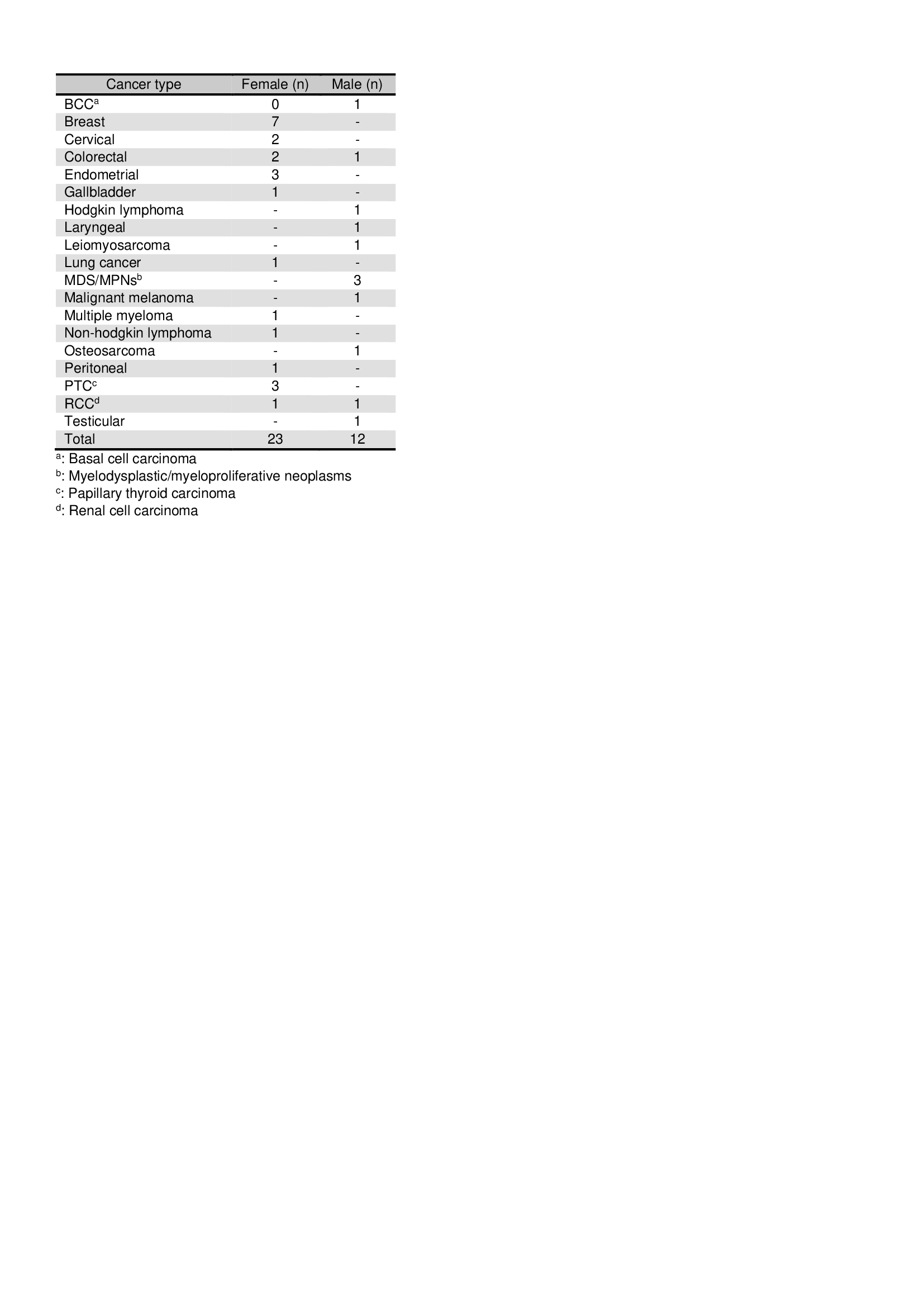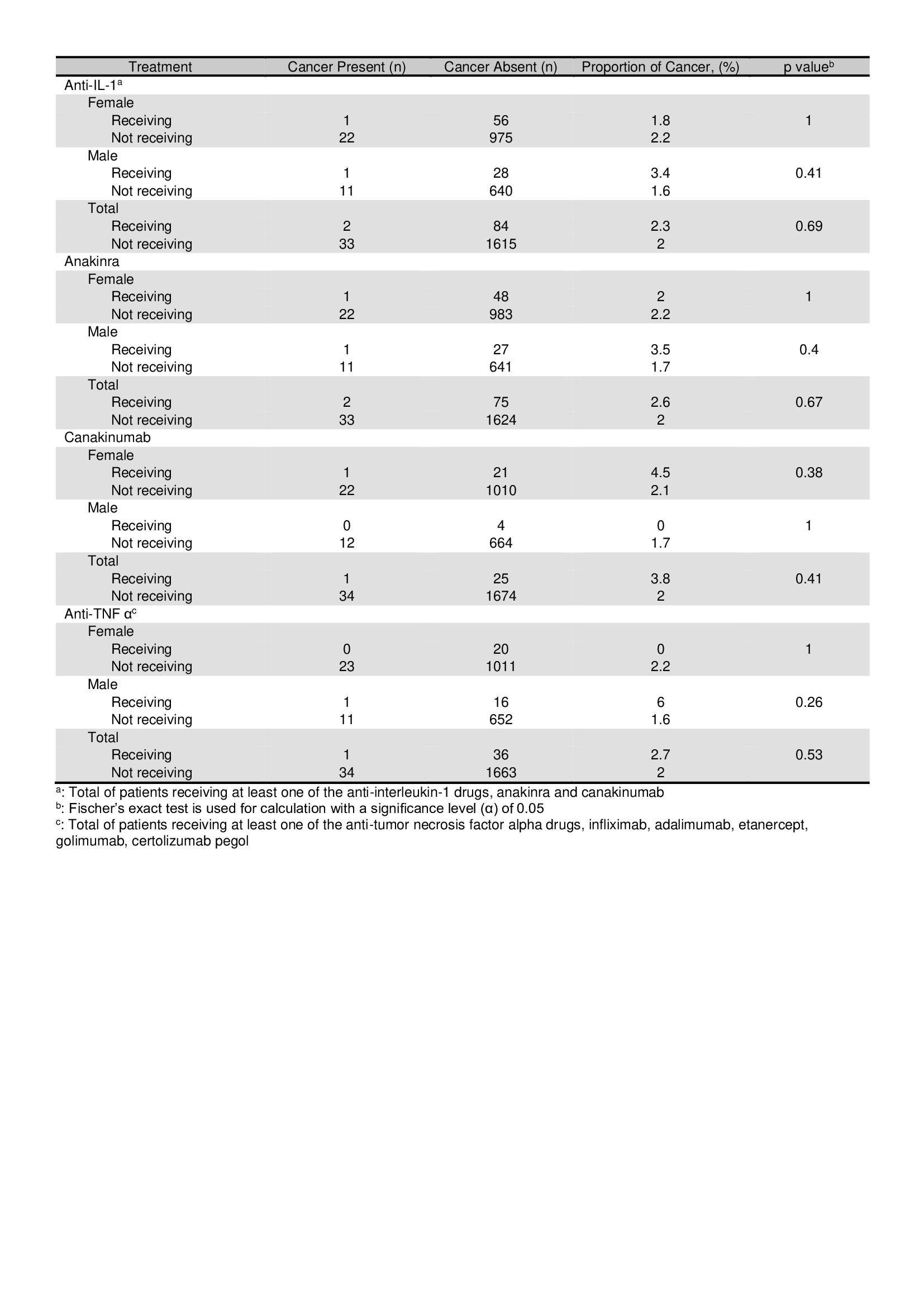Session Information
Session Type: Poster Session A
Session Time: 9:00AM-11:00AM
Background/Purpose: Familial Mediterranean Fever (FMF) is the most common hereditary monogenic fever syndrome characterized by recurrent attacks of fever and polyserositis. Anti-inflammatory drugs, with colchicine being the first-line therapy, have been used in FMF treatment to provide improvement in attacks and prevent amyloidosis, the most serious complication of the disease. Various types of cancer may be observed in FMF patients. This study aimed to evaluate the association between FMF and the risk of cancer, by using the cancer-related outcomes of a cohort of Turkish FMF patients and those of the general Turkish population.
Methods: We retrospectively screened the cancer statistics of our study group consisting of 1734 Turkish FMF patients registered at our division. Data were gathered from patient files, digital records, or from patients themselves verbally. Cancer-related estimates of the Turkish population were published by the Ministry of Health of Turkey in the Turkey Cancer Statistics Report (TCSR), in 2017. Standardized incidence rates (SIR) were calculated to compare the cancer incidences observed in our study group with the expected cancer incidences of the Turkish population. Indirect age adjustment was used, assuming the TCSR data as standard population outcomes. Considering FMF as a hereditary disorder, the onset of disease exposure was set as the year of birth. Statistical analysis was conducted in the general study group and subgroups based on gender and usage of biological agents (anti-IL-1 and anti-TNF-α drugs). Proportions of patients with a cancer diagnosis were calculated for the analysis of biological agent treatment subgroups. Our study protocol was compliant with the Helsinki Declaration and approved by the local ethics committee.
Results: Females made up 1054 (60.8%) of the patients in our study group . The mean age of the patients was 39.8±11.6 years while the mean duration of disease exposure was 15.1±7.43 years. Total follow-up was 68,784 person-years. Malignancy occurred in 35 (2%) patients and 23 (65.7%) of them were female. Breast cancer was the most common cancer type in females (n=7, 30.4%), and among all cancer diagnoses (20%). Males were most frequently diagnosed with myelodysplastic/myeloproliferative neoplasms (n=3, 25%) (Table 1). The incidence of cancer was significantly lower in Turkish FMF patients, compared with the Turkish population [SIR 0.34 (95% CI 0.24-0.46), p< 0.01]. Cancer incidences were decreased among female patients [SIR 0.66 (95% CI 0.43-0.98), p=0.048] and among male patients likewise, but the association didn’t reach statistical significance for males [SIR 0.62 (95% CI 0.34-1.06), p=0.096]. No significant difference in risk of cancer was found for patients using anti-IL-1 or anti-TNF-α drugs.
Conclusion: Our findings suggest that Turkish FMF patients have a significantly lower incidence of cancer than the general population of Turkey. Patient characteristics, such as continuous exposure to anti-inflammatory drugs (primarily colchicine) and pathophysiological mechanisms of the disease can be interpreted for the explanation of this association.
To cite this abstract in AMA style:
Baspinar S, Kilic B, Azman F, Yuzbasioglu M, Guler Y, Tanin M, Gunay U, Can G, Ugurlu S. Cancer Incidence in Familial Mediterranean Fever [abstract]. Arthritis Rheumatol. 2023; 75 (suppl 9). https://acrabstracts.org/abstract/cancer-incidence-in-familial-mediterranean-fever/. Accessed .« Back to ACR Convergence 2023
ACR Meeting Abstracts - https://acrabstracts.org/abstract/cancer-incidence-in-familial-mediterranean-fever/


